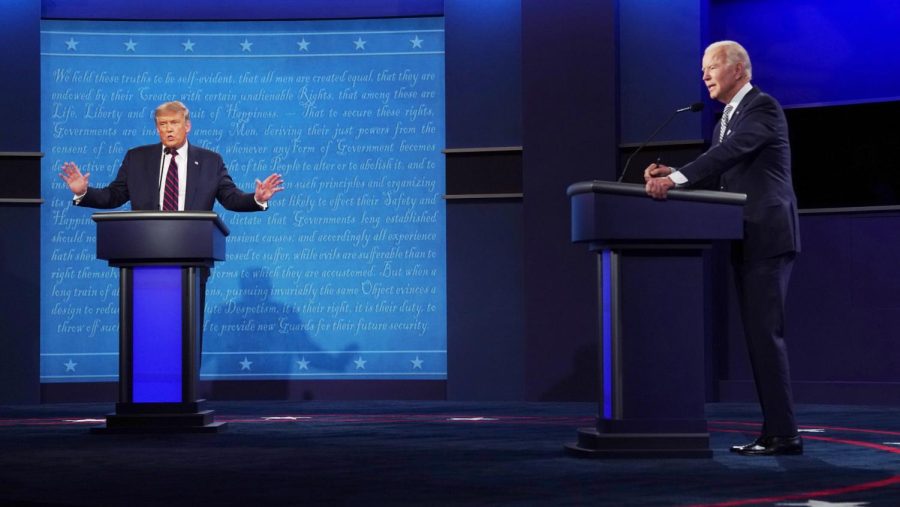President Donald Trump and former vice president Joe Biden clashed over issues like the response to COVID-19, maintaining law and order, as well as the state of the economy last Tuesday. This was the first of three debates before the 2020 Presidential Election on November 3.
Moderated by Chris Wallace at Case Western Reserve University’s Cleveland Clinic, the salient feature of the debate noted by students and professors alike was the frequent interruptions during the debate, largely, though not exclusively, by Trump.
Sam Jeske ’21 of the College Democrats concluded “that Donald Trump was not interested in a legitimate exchange of ideas or policies, but would rather throw tantrums and yell above his opponent and the debate moderator.”
Emily Eng ’21 of the College Republicans viewed the president’s performance a bit more positively.
“I think he was stronger in his attacks than Biden, but overall I think both sides could have been more mature and had stronger answers,” Eng wrote in an email.
John Kincaid, professor of Government & Law, noted that “I have seen every televised presidential debate in American history, and [Tuesday] night’s debate was the worst ever in my opinion.”
Wallace’s first question regarding the appointment of Amy Coney Barret to the Supreme Court devolved into a spar over the Affordable Care Act. Discussions about the economy, climate change, as well as COVID-19 response and the lockdowns likewise pitted the two candidates against one another.
“Joe Biden did an excellent job of speaking directly to the American people about issues like healthcare, COVID-19, and the economy. Biden is the obvious choice for America,” Jeske said.
Eng, on the other hand, pointed to Biden’s contradictions.
“[Biden] says that he does not back the Green New Deal, yet names it as a ‘crucial framework’ on his website,” she noted. “I think these will become problematic issues when it is time to vote.”
The debate devolved into personal attacks, with Trump denying a New York Times report which claimed he paid only $750 in federal taxes, while Biden defended his son’s business ventures in Ukraine.
A particularly controversial moment came when in response to a question over the president’s unwillingness to condemn white supremacists and militia groups, Trump responded “sure I’m willing to do that. But almost everything I see is from the left-wing, not from the right-wing.”
His comment for the self-described “Western Chauvinist” group the Proud Boys to “stand back and stand by” in particular was viewed by Kincaid as “egging on” this controversial group.
“President Trump’s refusal to disavow the Proud Boys was really terrible,” Kincaid added.
Eng agreed that Trump should “explicitly say that he condemns white supremacy,” but views the attacks as largely unfair.
“Earlier this week [Trump] proposed the ‘Platinum Plan’ which is to declare the KKK and Antifa as terrorist organizations and make Juneteenth a federal holiday,” she said.
Whether this debate will influence the outcome of the election remains to be seen.
“There are a few people in the margins that will be affected, but [debates] tend to reinforce more than they change people’s view,” Kincaid said.
The next two presidential debates will be held on the 15th and the 22nd of October, and will likely allow moderators to cut off the microphone of candidates who break the debate rules, according to a CBS report.























































































































